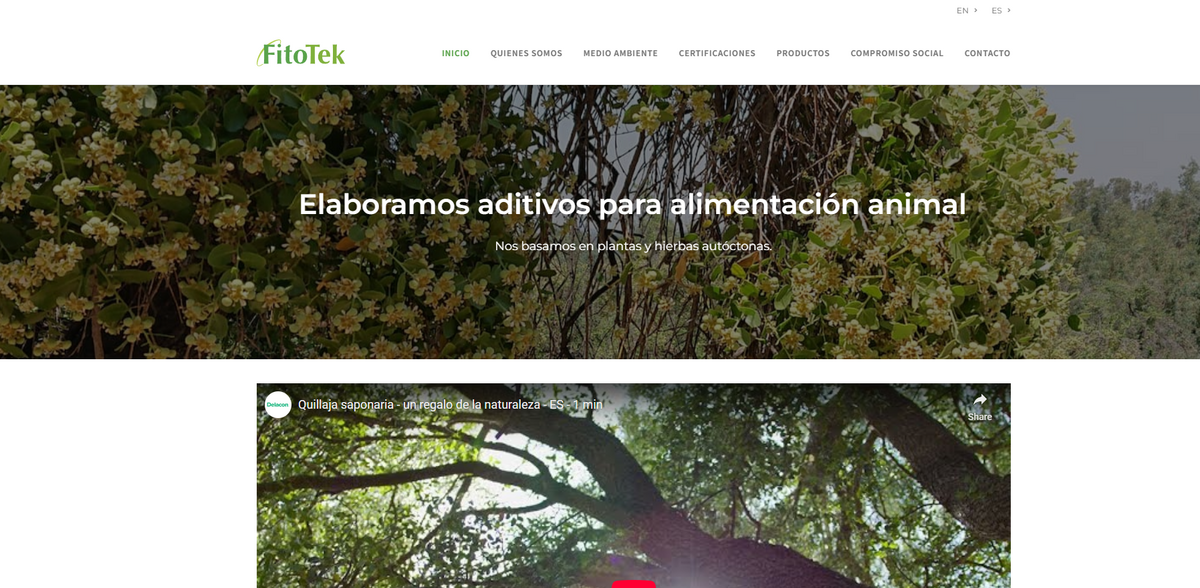What the Project Is
The project revolves around manufacturing animal feed additives based on medicinal plants and herbs. FITOTEK, a Chilean company, is inserted in a global business of animal nutrition. The plant-based solutions use native forests, and the facility is located in the Fifth Region in the Aconcagua zone at Putaendo commune. The project is focused on sustainable practices that enhance forest health while producing powders derived from the Chilean quillaja (quillay) and boldo tree – natural sources known for their beneficial properties, including aditivo nutricion animal quillay saponinas. It is an initiative that bridges traditional harvesting with modern animal feed applications, ensuring both environmental care and improved animal nutrition.
Main Benefit
Key facts and figures emphasize the project’s importance:
- Manufactures animal feed additives based on medicinal plants and herbs.
- Expertise in producing powder from native Chilean quillaja and boldo trees.
- Harvesting zones distributed in central Chile’s countryside – a region known for its sclerophyllous forests.
- Supports sustainable forest practices which not only reduce evaporation and improve drought resistance but also enhance CO2 entrapment.
- In animal feed, the use of these products significantly reduces greenhouse gas emissions (ammonia, methane) and improves feed conversion by reducing nutrient waste.
Environmental Impact & Sustainability
Environmental stewardship is a central pillar of the project. The pruning methodology allows for an initial reduction of the aerial parts of the trees, thereby minimizing evaporation and bolstering the trees’ drought resistance. This controlled process also supports faster regrowth and improves CO2 entrapment. The sustainable approach ensures that native forest areas are maintained while generating multiple benefits. With emphasis on good practices, the project contributes to preserving vital ecosystems—especially in the semiarid climates and hilly regions where sclerophyllous forests thrive. These practices are crucial, particularly as climate change increasingly threatens these unique ecosystems.
Quality Certifications & Safety
The project is built on a foundation of rigorous quality and safety standards. Food safety systems such as HACCP and GMP are in place, ensuring that each product meets high-quality criteria. Additionally, certification as ecological producers and compliance with the quality and safety system FAMI-QS underline a commitment to excellence. A clear traceability system tracks every log of wood from its origin to the final end-user, preserving the integrity of the sustainable product. This level of certification assures stakeholders that operational methods honor both food safety and environmental preservation.
Social and Local Commitment
A strong emphasis on local impact marks another dimension of the project. The workforce is composed of local residents who undergo extensive and ongoing training. The project actively supports municipal education through collaborations with local educational authorities and the Foundation Entre Pares. Moreover, the connection with the Municipality of Putaendo has led to initiatives that support the community in challenging times. These social commitments create a lasting legacy that goes beyond business – it is a practical example of how responsible production aligns with community welfare.
Project Impact
- SDG 2: Zero Hunger – Enhancing animal feed efficiency to support robust food production systems.
- SDG 12: Responsible Consumption and Production – Ensuring sustainable use of natural resources and implementation of eco-friendly harvesting practices.
- SDG 13: Climate Action – Contributing to global efforts by reducing greenhouse gas emissions and improving CO2 sequestration through sustainable forestry practices.
- SDG 15: Life on Land – Preserving native forest areas and biodiversity by following strict environmental guidelines and practices.
Industry Recognition and Global Context
The project stands out in the Wood & Wood products industry, not only for its innovative approach to combining animal nutrition with sustainable forestry but also for its impressive performance metrics – it has achieved a bcorp score of 101.8. This achievement reflects a commitment to environmental, social, and governance standards that many find inspiring. The approach is casual yet profound… blending advanced agricultural methods with nature-respectful practices. It remains clear that this enterprise is dedicated to fostering regional resilience and globally recognized environmentally friendly practices. The focus on aditivo nutricion animal quillay saponinas positions the project as a niche yet critical player in animal nutritional enhancements, making it a reference for industry peers seeking to balance profitability with sustainability. Amidst challenging times for ecosystems worldwide, initiatives like these offer a constructive pathway, emphasizing local community benefits, ecological balance, and a forward-thinking approach that resonates across international markets.


















